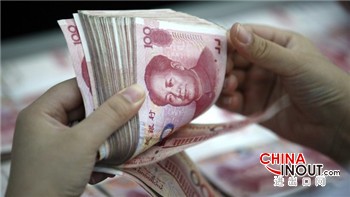如果中國人民銀行(PBoC)周一設(shè)定一個(gè)更低的人民幣兌美元匯率,,那將標(biāo)志著人民幣連續(xù)走低的天數(shù)打破紀(jì)錄,,并且進(jìn)一步表明,北京方面日趨以更廣泛的一籃子貨幣(而不僅僅是美元)來衡量人民幣的表現(xiàn),。
中國央行在過去10個(gè)交易日設(shè)定的人民幣兌美元中間價(jià)一天比一天低,,在此期間引導(dǎo)人民幣走弱的速度超過自2005年允許人民幣升值以來的任何時(shí)候,。過去兩周,人民幣兌美元匯率下降了1.5%,。
分析師們表示,,雖然這種直線方向?qū)Ρ本┓矫鎭碚f是不尋常的,但它反映了中國央行之前充分表達(dá)的愿望,,即它不再過分專注于美元,。
“美元本身已經(jīng)走高,因此此舉在一定程度上反映了這一點(diǎn),,盡管正常情況下中國央行喜歡注入一定程度的雙向風(fēng)險(xiǎn),,”巴克萊(Barclays)亞洲外匯和利率策略主管米圖爾科特查(Mitul Kotecha)表示。“像這樣引導(dǎo)中間價(jià)逐日走低似乎表明,,對(duì)投機(jī)者的厭惡已被暫時(shí)擱置,。”
本月早些時(shí)候,北京方面宣布將根據(jù)一籃子貨幣的價(jià)值來衡量人民幣,,此舉令市場(chǎng)感到意外,。雖然這個(gè)籃子在更大程度上是一種指引,而不是技術(shù)標(biāo)準(zhǔn),,但此舉被視為進(jìn)一步證實(shí)中國央行希望把市場(chǎng)的注意力從人民幣兌美元匯率引開,。
人民幣與美元密切掛鉤意味著,今年以來,,在美元強(qiáng)勁走高的背景下,,人民幣實(shí)際上是世界上最堅(jiān)挺的貨幣之一,今年迄今兌美元僅下降4.5%,,至1美元兌6.4811元人民幣,。在中國的貿(mào)易伙伴中,歐元兌美元匯率下降了10%,,澳元兌美元下降了12%,,韓元兌美元下降了7%。
投資者和分析師預(yù)計(jì),,人民幣還將進(jìn)一步下滑,。最近,人民幣兌美元離岸匯率和更受限制的在岸匯率之差有所加大,,這意味著國際市場(chǎng)預(yù)計(jì)人民幣將進(jìn)一步走低,。
但是,人民幣的這種弱勢(shì)意味著,,北京方面必須在允許人民幣走弱以幫助中國出口企業(yè)和導(dǎo)致資本外逃加劇的風(fēng)險(xiǎn)之間謹(jǐn)慎把握,。
“資本外流看起來強(qiáng)勁得令人不安,但中國央行似乎意識(shí)到,,(動(dòng)用儲(chǔ)備)以繼續(xù)迎合不是上策,,”蘇格蘭皇家銀行(RBS)駐新加坡高級(jí)市場(chǎng)策略師曼蘇爾莫希-烏丁(Mansoor Mohi-uddin)表示,。
中國央行3.5萬億美元的外匯儲(chǔ)備在今年8月減少創(chuàng)紀(jì)錄的940億美元,原因是該機(jī)構(gòu)在魯莽地實(shí)施引導(dǎo)人民幣走低舉措后試圖阻止資本外流激增,。盡管外匯儲(chǔ)備在10月企穩(wěn),,但上月再度減少870億美元,意味著資本再度離開中國,。(中國進(jìn)出口網(wǎng))

If the People’s Bank of China sets a softer dollar rate for the renminbi on Monday it will mark a record run of weakening and be a further sign that Beijing is increasingly measuring its currency’s performance not against the US but a broader range of its peers.
China’s central bank has “fixed” the renminbi at a lower rate against the dollar for each of the past 10 trading days, weakening its currency at a faster pace over that period than at any time since it first allowed it to appreciate in 2005. Over the past fortnight the renminbi has lost 1.5 per cent against the US currency.
Analysts said that although the straight-line direction was unusual for Beijing, it reflected a well-telegraphed desire by the People’s Bank of China to show it was not overly focused on the dollar.
“The dollar itself has been strengthening so this move reflects that to some extent, although normally the PBOC likes to instil a degree of two-way risk,” said Mitul Kotecha, head of Asia currency and rates strategy at Barclays. “Having a steadily weaker fix like this suggests that aversion to speculators has been put on the back burner for now.”
Earlier this month, Beijing surprised markets when it announced that it would measure the renminbi against a basket of currencies. Although the basket is more of a guide than a technical standard, the move was seen as further confirmation the PBOC wanted to draw attention away from the dollar rate.
The renminbi’s close dollar ties mean it is in fact one of the world’s strongest performers against the surging US currency this year, having lost just 4.5 per cent to date at Rmb6.4811. Among China’s trading partners, the euro has lost 10 per cent against the dollar, the Australian dollar 12 per cent and the Korean won, 7 per cent.
Investors and analysts expect the renminbi to slip further still. The gap between the currency’s dollar rate offshore and the more restricted onshore market has widened recently which implies international markets are pricing in more weakening.
But the softness means Beijing must tread carefully between allowing the weakness that would help its exporters and the risk that capital flight intensifies.
“Capital outflows look uncomfortably strong but the PBoC seems to realise it’s not the best policy to keep fully accommodating that [by drawing down its reserves],” said Mansoor Mohi-uddin, senior market strategist at RBS in Singapore.
The PBoC’s $3.5tn reserves fell by a record $94bn in August as it sought to stem the impact of a surge in outflows following its bungled devaluation. Although reserves had stabilised by October, they fell another $87bn last month, implying capital was once again leaving the country.











